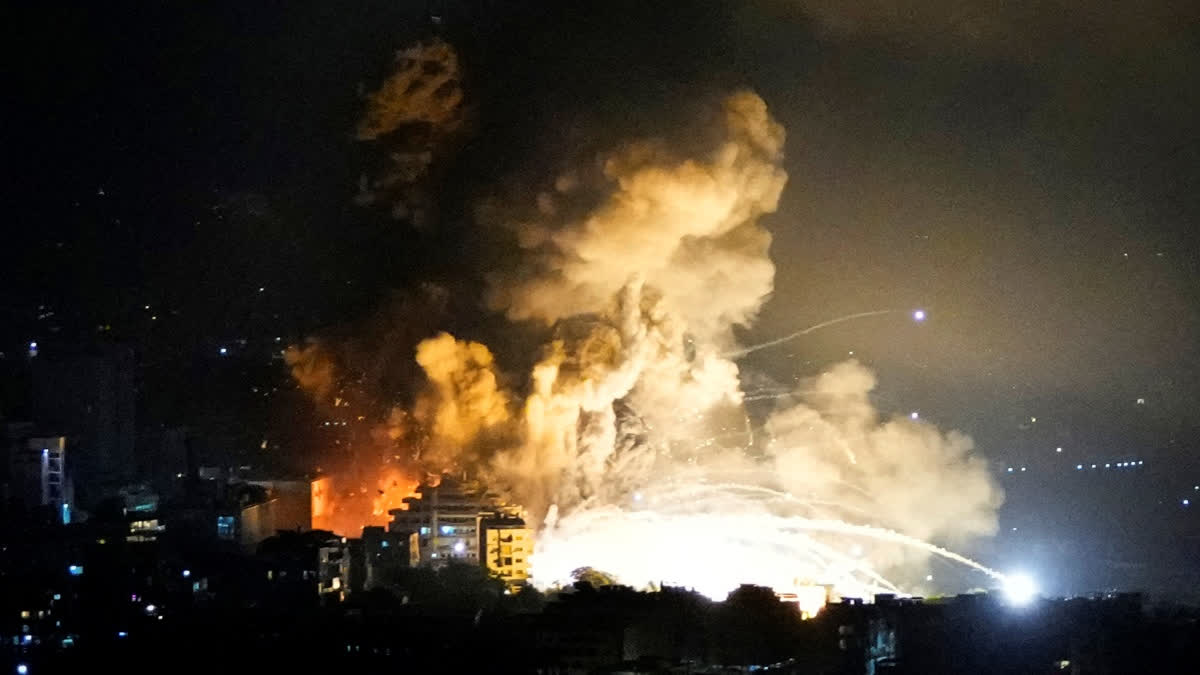Beirut: Israeli Defense Forces claimed on Saturday it had hit Hezbollah's headquarters in Beirut, killing important leaders, including Muhammad Ali Ismail and his deputy, Hussein Ahmed Ismail. The attack caused major destruction, damaging several buildings. The biggest blast to hit the Lebanese capital in the past year appeared likely to push the escalating conflict closer to full-fledged war. At least six people were killed and 91 were wounded, Lebanon's health ministry said.
Hezbollah leader Hassan Nasrallah was the target of the strikes on the group's headquarters, according to two people familiar with the matter who requested anonymity, including one US official. The Israeli army declined to comment on who it was targeting. It was not immediately clear if Nasrallah was at the site, and Hezbollah did not comment on the report.
The death toll is likely to rise significantly as teams are still combing through the rubble of six buildings. Israel launched a series of strikes on other areas of the southern suburbs following the initial blast.
🔴Muhammad Ali Ismail, the Commander of Hezbollah’s Missile Unit in southern Lebanon, and his deputy, Hussein Ahmad Ismail, were eliminated in a precise IAF strike.
— Israel Defense Forces (@IDF) September 28, 2024
Ali Ismail was responsible for directing numerous terrorist attacks against the State of Israel, including the… pic.twitter.com/Esoyg4pLM7
After the strikes, Prime Minister Benjamin Netanyahu abruptly cut short a visit to the United States to return home. Hours earlier, he addressed the UN, vowing that Israel's intensified campaign against Hezbollah over the past two weeks would continue further dimming hopes for an internationally backed cease-fire.
News of the blasts came as Netanyahu was briefing reporters after his UN address. A military aide whispered into his ear, and Netanyahu quickly ended the briefing. Israeli army spokesman Rear Adm. Daniel Hagari said the strikes targeted the main Hezbollah headquarters, saying it was located underground beneath residential buildings.
The series of blasts at around nightfall reduced six apartment towers to rubble in Haret Hreik, a densely populated, predominantly Shiite district of Beirut's Dahiyeh suburbs, according to Lebanon's national news agency. A wall of billowing black and orange smoke rose into the sky as windows were rattled and houses shook some 30 kilometres north of Beirut.
Footage showed rescue workers clambering over large slabs of concrete, surrounded by high piles of twisted metal and wreckage. Several craters were visible, one with a car toppled into it. A stream of residents carrying their belongings were seen fleeing along a main road out of the district.
Israel provided no immediate comment about the type of bomb or how many it used but the resulting explosion levelled an area greater than a city block. The Israeli army has in its arsenal 2,000-pound American-made Bunker Buster guided bombs designed specifically for hitting subterranean targets.
Richard Weir, crisis and weapons researcher with Human Rights Watch, said the blasts were consistent with that class of bomb.
Israel's air forces followed with a new set of strikes early Saturday, also in the southern suburbs, shortly after an Israeli military spokesman warned residents of three buildings to evacuate, saying they were being used by Hezbollah to hide weapons, including anti-ship missiles.
To a degree unseen in past conflicts, Israel this past week has aimed to eliminate Hezbollah's senior leadership. But an attempt to assassinate Nasrallah successful or not would be a major escalation. The Pentagon said the US had no advance warning of the strikes.
Four hours after the strike, Hezbollah had still not issued any statement referring to it. Instead, it announced that it had launched a salvo of rockets at the Israeli city of Safed, which it said was in defense of Lebanon and its people, and in response to the barbaric Israeli violation of cities, villages and civilians.
Israel dramatically intensified its airstrikes in Lebanon this week, saying it is determined to put an end to more than 11 months of Hezbollah fire into its territory. The escalated campaign has killed more than 720 people in Lebanon, including dozens of women and children, according to Health Ministry statistics. A predawn strike Friday in the mainly Sunni border town of Chebaa killed nine members of the same family, the state news agency said.
The scope of Israel's operation remains unclear, but officials have said a ground invasion to push the militant group away from the border is a possibility. Israel has moved thousands of troops toward the border in preparation.
President Joe Biden said the US had no knowledge of or participation in Israel's strikes. The White House said Biden ordered his national security team to assess if further action is needed to beef up security for American interests in the Middle East.
At the UN, Netanyahu vowed to continue degrading Hezbollah until Israel achieves its goals. His comments dampened hopes for a US-backed call for a 21-day truce between Israel and Hezbollah to allow time for a diplomatic solution. Hezbollah has not responded to the proposal.
Iranian-backed Hezbollah, the strongest armed force in Lebanon, began firing rockets into Israel almost immediately after Hamas' October 7 attack, saying it was a show of support for the Palestinians. Since then, it and the Israeli military have traded fire almost daily, forcing tens of thousands of people to flee their homes on both sides of the border.
In Gaza, Israel aims to dismantle Hamas' military and political regime, but the goal in Lebanon is to push Hezbollah away from the border, said the official, who spoke on the condition of anonymity due to military briefing guidelines.



